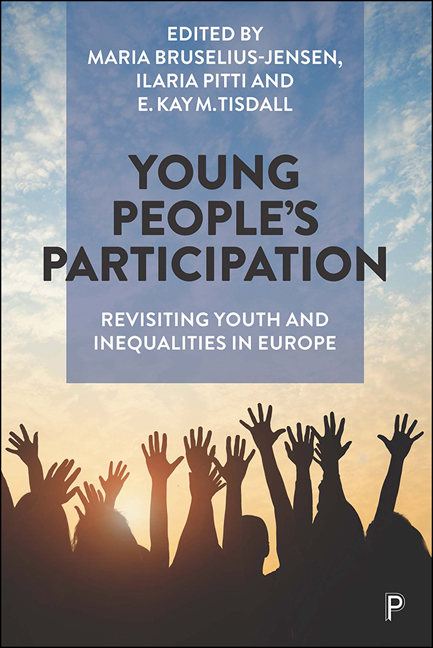Book contents
- Frontmatter
- Contents
- List of figures and tables
- Notes on contributors
- Acknowledgements
- 1 Revisiting young people's participation: an introduction
- PART I Young people's experiences of participation and engagement
- PART II Current state and conditions for young people’s participation: critiques and trends
- PART III Broadening participation: young people's own approaches to participation
- PART IV New opportunities for young people's participation: facilitating new forms of youth participation
- Index
17 - Revisiting young people's participation and looking ahead: concluding remarks
Published online by Cambridge University Press: 18 December 2021
- Frontmatter
- Contents
- List of figures and tables
- Notes on contributors
- Acknowledgements
- 1 Revisiting young people's participation: an introduction
- PART I Young people's experiences of participation and engagement
- PART II Current state and conditions for young people’s participation: critiques and trends
- PART III Broadening participation: young people's own approaches to participation
- PART IV New opportunities for young people's participation: facilitating new forms of youth participation
- Index
Summary
Introduction
Considerable policy and practice interest is currently promoting young people's participation, locally, nationally and internationally. It has become a popularised requirement for numerous domains, from community regeneration, to service planning, to policy making (Tisdall et al, 2014; Gal and Duramy, 2015). As discussed in this book's introduction, on the one hand, this popularisation is supported by the recognition of young people as current and not just future citizens, children and young people's human rights (including participation rights), and examples of young people influencing change. On the other hand, it is propelled by concerns about too many young people being disengaged with formal democratic politics, being potentially disruptive influences and changing demographics. Involving young people in decisions that affect them and their communities, and that address their concerns, both respects and binds young people's contributions to society.
Young people's participation is not new, from their contributions as family members, workers and leaders to their involvement in protests and strikes (Cunningham and Lavalette, 2016; Blakemore, 2018). What is new is a particular combination of discourses and trends, such as the decades that have articulated ‘youth’ as a separate (often transitional age-and stage-limited) category from ‘childhood’ and ‘adulthood’; the rise of human rights, which has gradually extended to recognising both children and young people as rights holders and embedding a host of formal institutions and opportunities for participation; globalisation, which has arguably both connected much of the world's population digitally, economically and culturally, while also widening inequalities and creating new threats; and the 2008 worldwide financial crisis, which shook particularly the Global North and traditional welfare states, to the disadvantage of young people's future prospects. Further, simultaneously with this book's deadline, the COVID-19 pandemic has created a host of economic and societal changes with immediate and future effects on young people and their participation. Such a combination of discourses and new trends underlies and influences changes for young people's participation and requires subsequent reflection and conceptual development to support and challenge future practices. This book sits within such requirements, seeking to understand the changing practices of young people's participation and changing opportunities for youth engagement in society.
- Type
- Chapter
- Information
- Young People’s ParticipationRevisiting Youth and Inequalities in Europe, pp. 293 - 304Publisher: Bristol University PressPrint publication year: 2021



